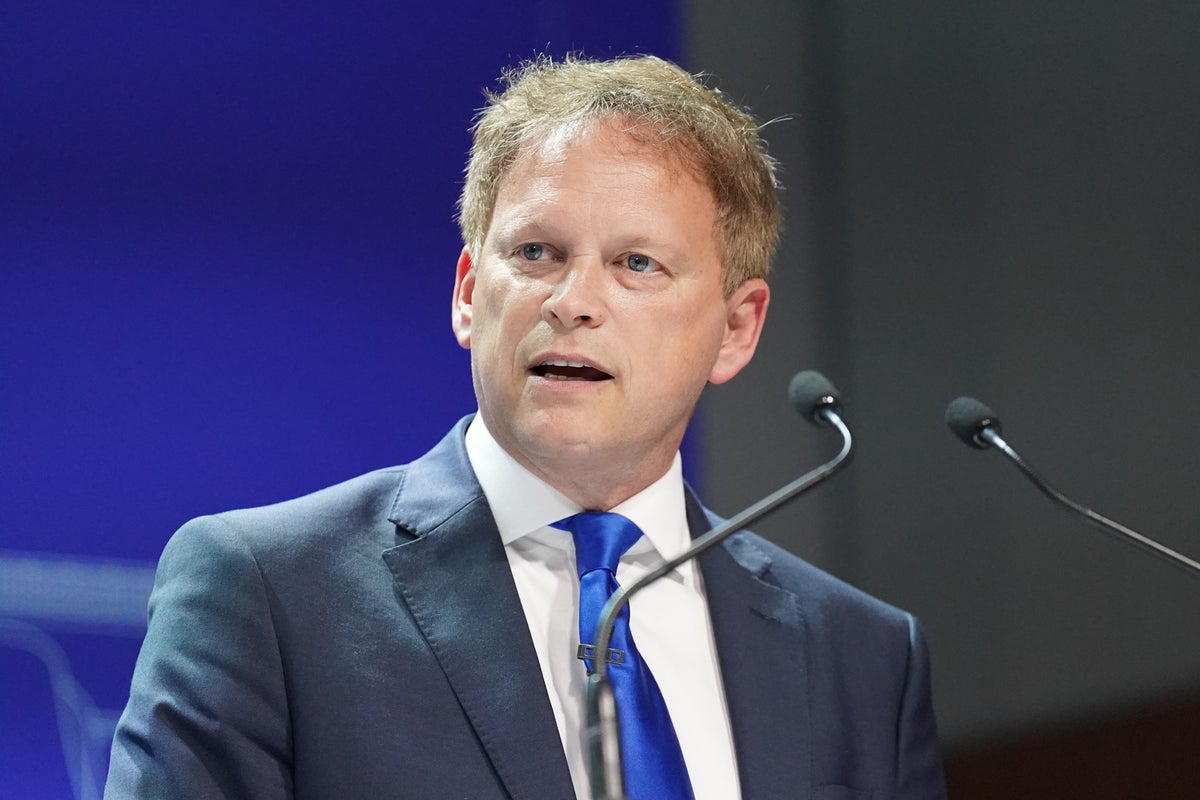
Energy secretary Grant Shapps has warned senior Conservatives pushing for Rishi Sunak to ditch green policies that the government’s net zero pledge remains vital.
The cabinet minister said that the global climate crisis poses a threat to Britain’s security and energy supply, as he fired back at Tory MPs calling for No 10 to scrap measures deemed too costly.
“We can’t have global security without net zero,” Mr Shapps told Politico. “There’s no global security if millions of people are having to uproot because of weather patterns.”
He also unveiled plans for the UK to host a global energy security summit next year, and hinted that China could be invited, saying he wanted the conference “to be inclusive”.
Oil giants like Qatar and Saudi Arabia should be “in the room” at what he said would be a “real-world, gritty energy-security conference where we are talking about the realities of the world that we live in”.
But he faced an immediate backlash from Tory MPs on both issues. Ex-business secretary Sir Jacob Rees-Mogg told The Independent that Mr Shapps was “fundamentally wrong”, and insisted that the UK is a major contributor to global security “through our economic strength”.
“The rush to net zero at the expense of the economy is a threat to global security,” Mr Rees-Mogg said. On China, he added: “I think to take the view that China enhances our security in any way is eccentric.”
Mr Sunak has appeared to shift his tone on green policies after his party unexpectedly clung on to its Uxbridge and South Ruislip seat by seizing on the backlash against the London mayor’s proposal to expand the Ulez scheme, which levies a fee on some motorists in an effort to combat air pollution.
Rishi Sunak is under pressure on climate change— (PA Wire)
The PM – who vowed to be on the side of motorists and said “banning things” was not the right approach – also gave the green light to 100 new licences for oil and gas exploration and production in the North Sea, despite opposition from environmentalists and green Tories.
Some Tory backbenchers have urged Mr Sunak to go further and renounce plans to ban new oil boilers by 2026 and new petrol and diesel vehicles from 2030.
But Mr Shapps has sent a strong signal that he believes in the push away from fossil fuels and towards renewable energy, arguing it is a vital part of the promise to reach net zero carbon emissions by 2050.
The energy secretary said that “part of the answer” to energy supply problems can be found in “the need to diversify from fossil fuels”. He added: “Greater diversity could actually give us much greater security.”
He said: “Imagine if the UK hadn’t moved from less than 7 per cent renewables to – as we see in the first quarter of 2023 – 47 per cent renewables. Imagine that hadn’t happened and we went into the energy shock. What would the impact have been?”
Rishi Sunak with Grant Shapps— (via Reuters)
Mr Shapps announced plans for Britain to host an international summit on energy security next year, pencilling it in for spring 2024 to coincide with the second anniversary of Russia’s Ukraine invasion.
Referring to the need to move away from fossil fuel dependence, he said: “[The energy security summit] will be about getting to net zero, ultimately. From an energy security point of view, it’s important that we do both.”
Defending the new licences, he added: “We’re not going to do it while screwing our population. We’re going to do it while taking our population with us. That means accessing our own oil and gas rather than importing [it from] others.”
Mr Sunak is under pressure from two warring Tory camps: the Conservative Environment Network, whose members are pushing for stronger action on climate change, and the Net Zero Scrutiny Group, which is lobbying for environmental policies to be watered down.
Net zero sceptics want the PM to build on the success of the anti-Ulez by-election result in Uxbridge by scrapping Boris Johnson’s policy to ban the sale of new petrol and diesel vehicles from 2030.
Sunak is accused of being ‘uninterested’ in fulfilling Boris Johnson’s climate policies— (Getty/AP)
He also faces a rebellion on the de facto ban on oil boilers from 2026, which mostly affects those living in off-grid homes in the countryside. Former environment secretary George Eustice described the policy as “Ulez for rural communities”.
Former home secretary Priti Patel said the government should pause all its climate targets, while Sir Jacob said the country “cannot afford net zero as currently planned”.
Mr Sunak has angered green Tories in recent weeks, after he signalled his sympathy with those worried about the cost of climate policies by saying he doesn’t want to “hassle” families in the quest to achieve net zero.
Former energy minister Chris Skidmore, who led the government’s net zero review, said the decision to grant 100 new fossil fuel licences was “the wrong decision at the wrong time” and warned the PM that he risked being on the “wrong side of history”.
And Tory peer Zac Goldsmith told the BBC this week that he was “very tempted” to back Labour at the next general election because of the government’s failure to push on with its net zero commitments.
A staunch Johnson ally, Lord Goldsmith recently quit Mr Sunak’s government in a blaze of acrimony as he accused the PM of being “uninterested” in the climate emergency.
Rob Ford, professor of politics at Manchester University, told Politico that U-turning on net zero policies would “cost more votes than it will gain” because the “only people who will pay attention to it are the people who don’t like it”.






